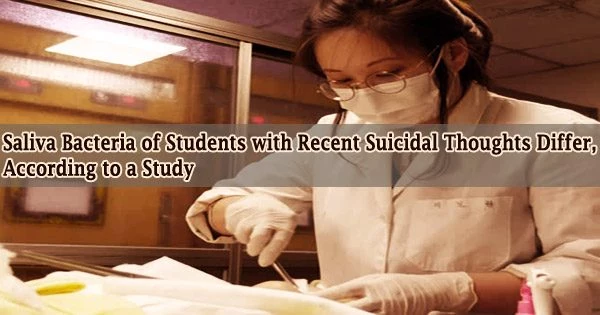According to a recent University of Florida study, college students who reported having recently considered suicide had germs in their saliva that were significantly different from those of students who had not.
This study is the first to examine bacterial variations in the saliva of individuals with and without recent suicidal thoughts, commonly known as suicidal ideation, despite the fact that there is an expanding body of research on mental health and the human microbiome.
Suicidal thoughts that had recently occurred were those that had occurred in the two weeks prior to the saliva sample being collected.
The researchers discovered that students with recent suicidal thoughts had greater levels of bacteria associated with periodontal disease and other inflammatory health disorders after controlling for the influence of other factors known to affect mental health, such as food and sleep.
They also discovered that the bacteria Alloprevotella rava, which is known to create a chemical that supports brain health, was present at lower levels in these adolescents. Additionally, the researchers discovered that these students had a genetic difference that might affect the amount of Alloprevotella rava in the mouth.
“These results are exciting because they tell us which bacteria we need to look at more closely. Our question now is, what are these bacteria doing biologically that affects mental health?” said Angelica Ahrens, first author of the study and a postdoctoral researcher in the UF/IFAS microbiology and cell science department.
Ahrens led the study as part of her doctoral program in the UF/IFAS College of Agricultural and Life Sciences.
“Eventually, we hope this line of research could help predict suicidal ideation based on a person’s microbiome and could inform pro or prebiotic treatments for those at risk,” said Ahrens.
Mental health and suicide are serious issues on college campuses, and our students were very interested in being a part of research that can help address this problem. We are continuing to collect data for follow-up studies and hope more students and universities will become involved.
Eric Triplett
The study examined saliva obtained from approximately 500 undergraduate students enrolled in courses offered by the University of Florida’s department of microbiology and cell science.
Additionally, these students filled out the Patient Health Questionnaire-9, which is used to check for signs of depression and inquires about recent suicidal thoughts. People who disclosed having recently considered suicide were sent to the campus’s mental health facilities.
“Mental health and suicide are serious issues on college campuses, and our students were very interested in being a part of research that can help address this problem. We are continuing to collect data for follow-up studies and hope more students and universities will become involved,” said Eric Triplett, chair of the microbiology and cell science department and senior author of the study.
In college-aged adults, depression and suicide ideation are relatively common: According to a CDC report from 2020, up to 25 percent of individuals between the ages of 18 and 24 had considered suicide seriously within the previous month.
Initially, participants had to bring a saliva sample to the lab for this study, but now they can choose to send their saliva sample by mail using a collection kit created by the researchers.
“This at-home method is very convenient for students and also helps us build a more diverse dataset and test different variables. For example, we would like to look at the saliva microbiome of people who have been diagnosed with depression and are taking antidepressants,” Ahrens said.
“While various treatments and lifestyle changes can help, there is still much to be learned about how the human microbiome affects mental health and could be harnessed to improve it,” Ahrens said.





